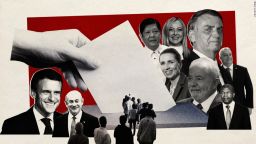Luiz Inácio “Lula” da Silva was sworn in as Brazil’s president for the third time on Sunday, as threats of violence loomed from supporters of his predecessor, Jair Bolsonaro.
“I promise to maintain, defend and fulfill the constitution, observe the laws, promote the general good of the Brazilian people, support the unity, integrity and independence of Brazil,” Lula said.
The 76-year-old politician, returning to the presidency after a 12 year hiatus, arrived with his wife, Rosangela da Silva, at the Metropolitan Cathedral in Brasília at 12:20 p.m. local time before heading to congress where a formal congressional session took place.
Parliamentarians applauded Lula before breaking into a chant of “ole, ole ola, Lula, Lula.”
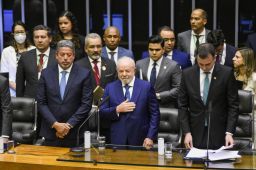
The Senate president opened the ceremony by paying respects to Pelé and Pope Benedict with a minute of silence.
During the ceremony, Lula broke with traditional protocol to tell a short story about the pen he used to sign congressional documents.
“In 1989 was in a rally in Piaui, then we walked until the San Benedict church, and a citizen gave me this pen and asked me to use this to sign in if I win the election in ’89. I didn’t win the election in ‘89, didn’t win in ‘94, didn’t win ‘98. In 2002 I won, but when I arrived here I had forgotten the pen and signed with a senator pen. In 2006, I signed with the Senate pen, and now I found the pen, and I do in honor of the people of Piaui state,” he said.
The newly inaugurated president and the first lady then traveled in an open car parade to attend a military honors ceremony outside the presidential palace.
Looming over the ceremony was the notable absence of Bolsonaro, who left Brazil for Florida on Friday and did not specify his return date.
His trip to the United States breaks with Brazilian convention of outgoing leaders being present at their successors’ inauguration ceremony. It came as Brazil’s government issued an ordinance on Friday authorizing five civil servants to accompany “future ex-president” Bolsonaro to Miami, Florida, between January 1 and 30, 2023.
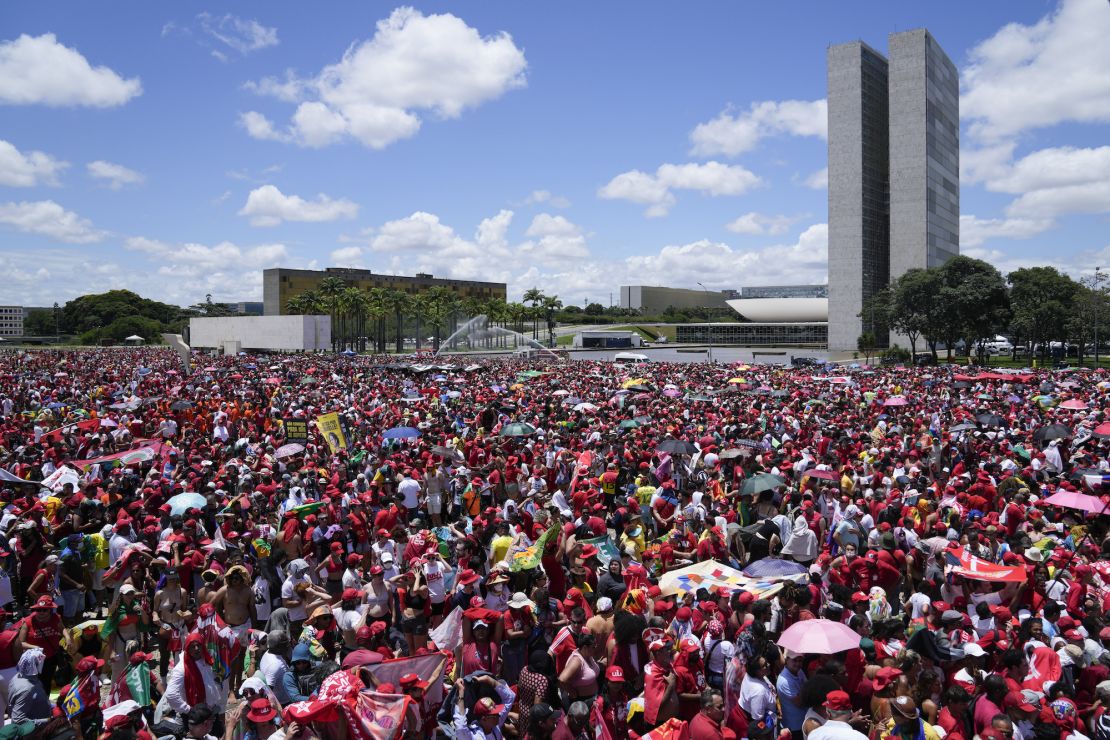
Lula won a tight run-off race on October 30, in a stunning comeback that marked the return of the left in power in Brazil following four years of Bolsonaro’s far-right administration.
Lula accomplished a remarkable return to power after a series of corruption allegations that led to his imprisonment for 580 days. The Supreme Court later ruled it a mistrial, clearing his path to run for reelection.
After previously governing Brazil for two consecutive terms between 2003 and 2010, Lula will inherit a country with crippling debt and much higher levels of poverty than when he left office.
Bolsonaro’s former vice president, Hamilton Mourao, addressed the nation in a speech on national television this Saturday on the last day of his government and criticized leaders whose silence created “an atmosphere of chaos.”
“Leaders that should reassure and unite the nation around a project for the country allowed that silence to create an atmosphere of chaos and social division,” said Mourao, who added that the armed forces had to pay the bill. Since the election results, Bolsonaro had addressed the public only three times. He did not accept election results in those addresses, fomenting his radical base into believing the result could be reversed.
President vows to rebuild country
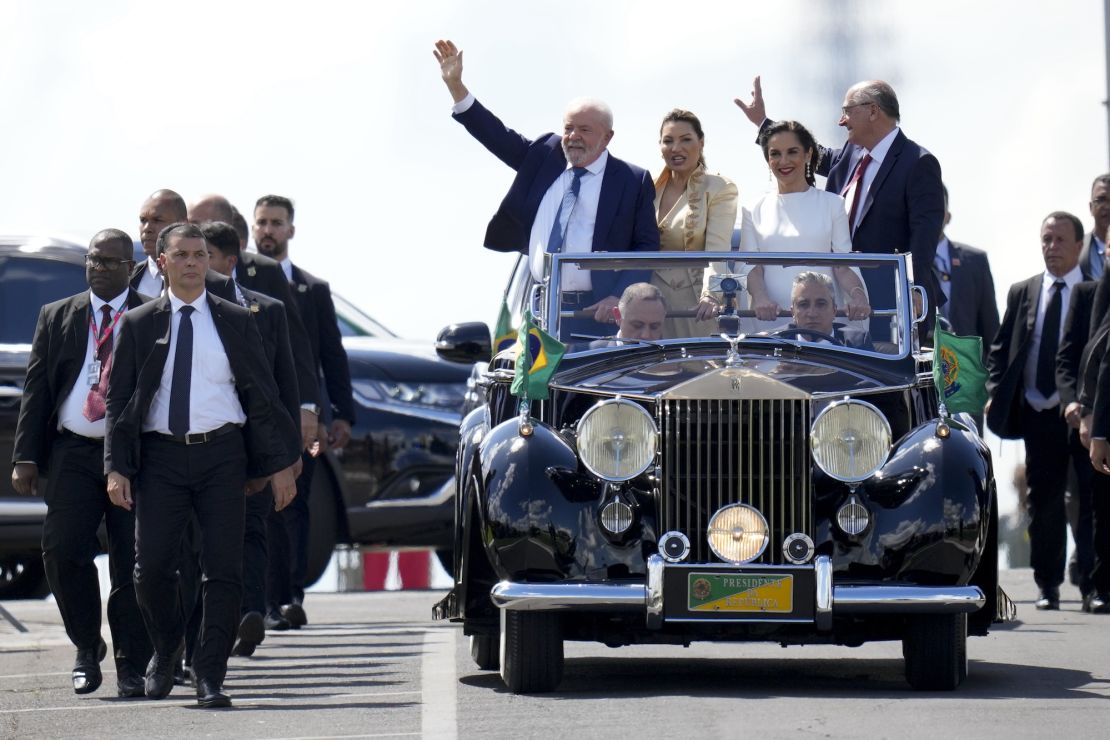
Lula vowed to rebuild the country, after thanking the “vow of trust given by the Brazilian people” during a speech addressing Congress.
“Today our message to Brazil is of hope and reconstruction,” Lula said. “If we are here today, it is thanks to the political conscience of Brazilian society, and the democratic coalition that we built during the campaign.”
Lula said that democracy was the biggest winner of the Brazilian election after his campaign was able to overcome a series of obstacles.
“Despite everything, the decision in the ballots prevails, thanks to an electoral system internationally recognized for its efficacy. It was fundamental the courageous attitude of the Judiciary, mostly from the Supreme Electoral Court,” Lula continued.
Lula proceeded his speech by criticizing the government of Bolsonaro, accusing the former president of using Brazil’s resources to further increase his power.
“The diagnosis we received from the transition cabinet is appalling. They emptied the resources for health, dismantled education, culture, science, they destroyed the environmental protections, haven’t left resources to school meals, vaccines, public security, forest protection and social assistance,” Lula said.
Lula revoked measures of the Bolsonaro government on his first day as president, reversing Bolsonaro’s loosening of controls for firearms and ammunition and his strong commitment to expand gun ownership in Brazil.
The president also reestablished the Amazon Fund, which uses foreign funds for projects that fight deforestation and preserve the environment in the Amazon. Germany and Norway have been the main sponsors of the Amazon Fund thus far. Under Bolsonaro, the fund was left untouched while then-environmental minister Ricardo Salles dissolved committees responsible for managing the resources.
Lula approved the reconstruction of Brazil’s main environmental agency, Ibama, which had seen staff cuts after Bolsonaro severely cut its budget.
Lula signed a decree establishing the a federal 600 reais monthly benefit for low-income families. The program’s original name, Bolsa Família, was also reinstated. Bolsonaro had changed the name to Auxilio Brasil during his administration.
Lula also extended the tax cuts on fuels, a measure introduced by Bolsonaro in 2022 that brought down prices at petrol pumps that expired at the end of the year. Lula extended it for 60 days. The measure is seen by many as populist and controversial as it deprived the federal administration of resources.
These last two acts are “provisional measures,” meaning they are instituted for 60 days to give time for discussion and votes by Congress.
Threats of violence
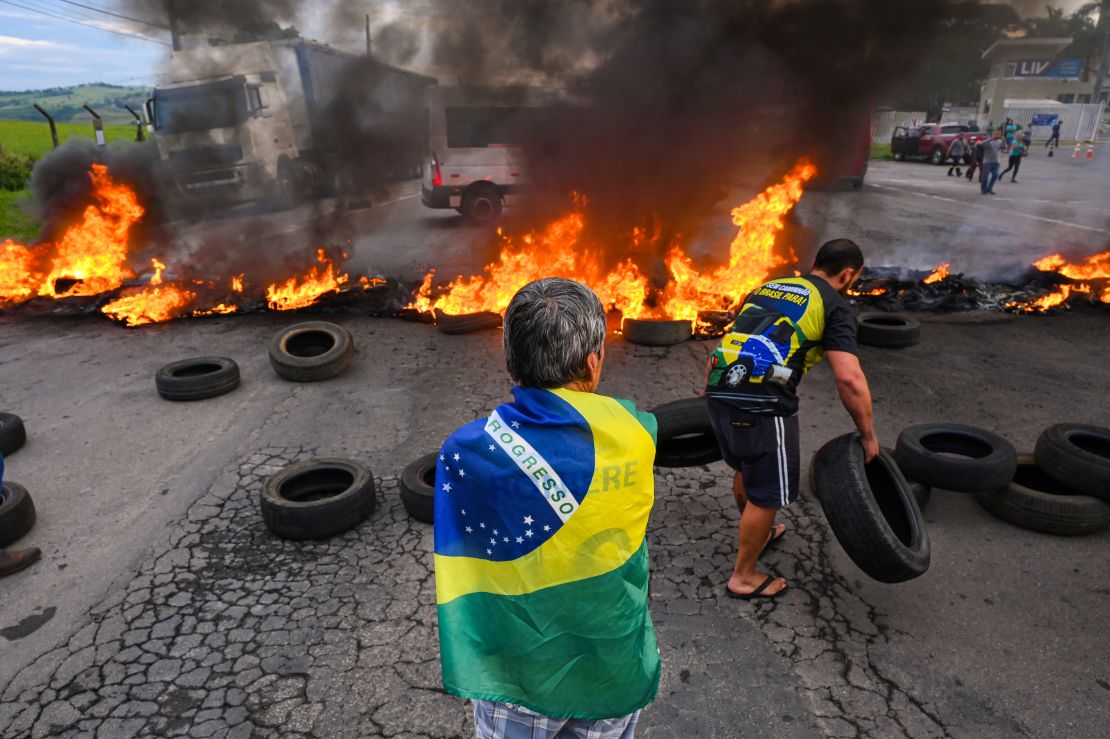
Violence has taken grip of the country with Bolsonaro yet to explicitly concede his election loss, despite his administration saying it is cooperating with the transition of power.
Security presence at Lula’s inauguration was high, as approximately 8,000 security agents from several security forces were mobilized Sunday, according to the Federal District’s security department.
Earlier on Sunday, a man was arrested in Brasilia after he was caught trying to get into the inauguration party carrying a knife and fireworks, the State Police of the Federal District said in a statement. The suspect traveled from Rio de Janeiro.
A Brazilian Supreme Court judge on Wednesday ordered a four-day ban on carrying firearms in the capital that will run through the end of Sunday, as a precautionary measure ahead of the ceremony.
It will not apply to active members of the armed forces, policemen and private security guards, Judge Alexandre de Moraes wrote.
Lula da Silva’s team had requested the ban on firearms at the inauguration days after police arrested a man on suspicion of planting and possessing explosive devices at Brasilia International Airport.
The suspect, identified as 54-year-old gas station manager George Washington de Oliveira Sousa, is a Bolsonaro supporter and told police in a statement, seen by CNN, that he intended to “create chaos” so as to prevent Lula from taking office again in January.
Moraes’ ban came into force as thousands of Bolsonaro supporters have gathered at military barracks across the country in protest of the election result, asking the army to step in as they claim, with no evidence, that the election was stolen.
Bolsonaro condemned Sousa’s bombing attempt on Friday, saying “there is no justification” for a “terrorist act.”
“Brazil will not end on January 1, you can be sure about that,” the outgoing president said in reference to Lula’s inauguration date.
“Today we have a mass of people who know more about politics,” he added. “They understand they are at risk. Good will win. We have leaders all over Brazil. New politicians or reelected politicians, they will make a difference.”
A U-turn on deforestation policy
Lula praised Brazil’s natural resources and promised a U-turn to his predecessor’s deforestation policy in the Amazon while aiming to maximize the country’s potential.
“No other country has the conditions Brazil has to become an environmental power. Having creativity, the bioeconomy and socio biodiversity enterprises as starting points, we will start the energy and ecology transition towards sustainable agriculture and mining activities, family agriculture and green industry. Our goal is zero deforestation in the Amazon, zero greenhouse gasses emissions,” Lula said during his address to Congress.
“We will not tolerate (…) the environmental degradation and deforestation that harmed the country so greatly. This is one of the reasons, albeit not the only one, for the creation of the indigenous people’s ministry,” Lula continued.
The new Brazilian president promised to address the inequality inflicted on minorities in the country by creating “the ministry of racial equality promotion to expand the affirmative action policy in universities and public service, as well as resuming policies for Black and brown people in the health, education and culture areas.”
CNN’s Camilo Rocha, Sana Noor Haq and Marcia Reverdosa contributed reporting.



